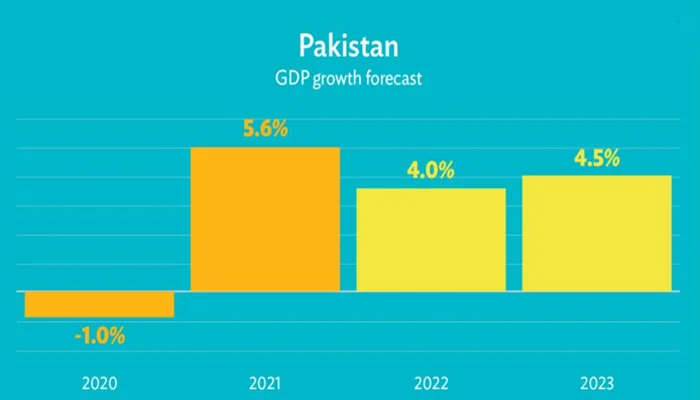- ADB, however, says growth is expected to accelerate to 4.5% in FY23.
- “Pakistan’s economy is recovering steadily due to well-coordinated fiscal and monetary responses to the pandemic,” ADB country director says.
- Manilla-based institute notes that in FY22, industrial growth is forecast to decelerate.
ISLAMABAD: Following a remarkable economic rebound in the previous fiscal year 2020-21, the Asian Development Bank (ADB) projected Pakistan’s economic growth to slow down to 4% in the ongoing fiscal year 2021-22 amid tighter fiscal and monetary policies before picking up again in the fiscal year 2022-23.
According to the Asian Development Outlook (ADO), 2022 — ADB’s annual flagship economic publication — Pakistan’s gross domestic product (GDP) growth is projected to slow to 4% in FY22 from 5.6% in FY21 as the government applies measures to reduce the current account deficit, raise international reserves, and cut inflation.
“Growth is expected to accelerate to 4.5% in FY23 due to stronger private consumption and investment,” the Manilla-based institution projected.
Commenting on the forecast, ADB Country Director for Pakistan Yong Ye said: “Pakistan’s economy is recovering steadily thanks to well-coordinated fiscal and monetary responses to the pandemic.”
“These led to a remarkable expansion in the industry and services sectors. It is key to continue structural reforms along with appropriate fiscal and monetary policies to contain rising inflation and external imbalances. Comprehensive reforms in tax policy and administration are also critical to boosting revenues in order to fund essential public services. ADB is fully committed to supporting Pakistan’s sustainable development.”
The ADB further noted that in FY22, industrial growth is forecast to decelerate, reflecting fiscal and monetary tightening together with significant depreciation of the local currency, and upward adjustments to domestic oil and electricity prices.
Meanwhile, agriculture is expected to continue lending impetus to GDP growth supported by the government’s package of subsidised inputs and increased support prices of wheat and sugarcane.
The Manilla-based institution further added that inflation declined to 8.9% in FY21 but is expected to pick up in FY22 to around 11% due to higher international energy prices, significant currency depreciation, and elevated global food prices from supply disruptions.
As a net importer of oil and gas, Pakistan will continue experiencing strong inflationary pressures for the remainder of FY22 from the jump in global fuel prices resulting from the Russian invasion of Ukraine.
“Inflationary pressures are likely to be less pronounced in FY23, with inflation forecast to drop to 8.5% as fiscal consolidation progresses and oil and commodity prices stabilize,” the report mentioned.

 Latest News3 days ago
Latest News3 days ago
 Latest News3 days ago
Latest News3 days ago
 Latest News2 days ago
Latest News2 days ago
 Business3 days ago
Business3 days ago
 Latest News2 days ago
Latest News2 days ago
 Latest News2 days ago
Latest News2 days ago
 Business3 days ago
Business3 days ago
 Latest News2 days ago
Latest News2 days ago






















